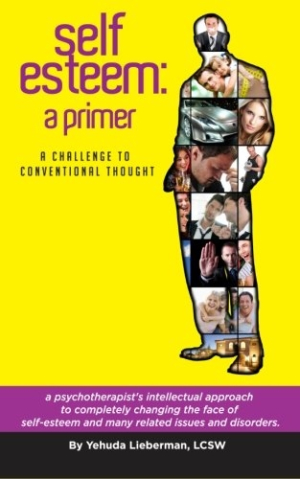It looks like you've stumbled upon a page meant to be read by our code instead of viewed directly. You're probably looking for this page.
Self-Esteem: A Primer
A Challenge to Conventional Thought
Psychotherapists try to help people correct negative behavior patterns, but treatment can take years of diligent work by both patient and therapist. Yehuda Lieberman, a practicing psychotherapist, concentrates on examining the causes rather than the symptoms of his patients’ distress, achieving success while speeding up the healing process.
In Self-Esteem: A Primer: A Challenge to Conventional Thought, Lieberman explains his treatment method. The author refers to the work of psychoanalyst Erik Erikson, who posited that children begin forming a sense of self at age thirteen and complete the process by age twenty. Lieberman supports Erikson’s theory that individuals who harbor a negative self-image caused by unpleasant teenage experiences often fail to realize their true potential as adults. They don’t understand the reasons for their fears and insecurities or know how to overcome these misconceptions of self. Lieberman believes self-esteem improves when people recognize that their juvenile ideas about self can be destructively inaccurate.
The book’s principle topics, divided into seven chapters, are organized to correspond with Lieberman’s treatment process. He begins by defining self-esteem and moves on to discuss influences that shape one’s feelings of self and general outlook on life. The book concludes with guidelines to help people identify and work through problems that threaten the progress they’ve made. Summaries of case histories help readers to understand more completely each step in the treatment process.
Lieberman presents his ideas in easily understood language that succeeds in explaining the technical aspects of his treatment method. By choosing to write in the first person, he achieves a conversational connection with the reader.
Careful editing has ensured an error-free text, but the addition of headings and subheadings, to designate content and provide visual relief to the dense text, would have improved the book’s readability. The collage of color photographs on the cover and the black-and-white illustrations and quotations that precede each chapter effectively anticipate the ideas to follow.
Those interested in gaining insight into themselves and others can benefit from reading Self-Esteem: A Primer. Psychology teachers and mental-health professionals should also find this short primer a valuable resource.
Reviewed by
Margaret Cullison
Disclosure: This article is not an endorsement, but a review. The publisher of this book provided free copies of the book and paid a small fee to have their book reviewed by a professional reviewer. Foreword Reviews and Clarion Reviews make no guarantee that the publisher will receive a positive review. Foreword Magazine, Inc. is disclosing this in accordance with the Federal Trade Commission’s 16 CFR, Part 255.
